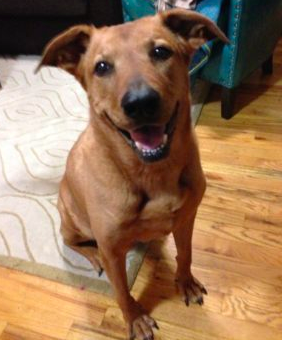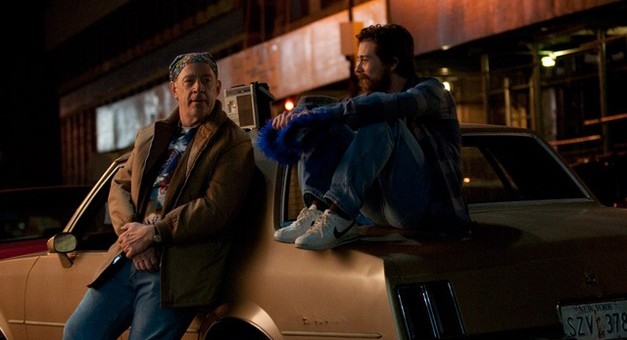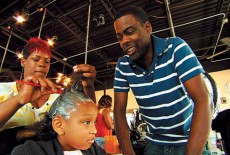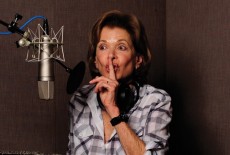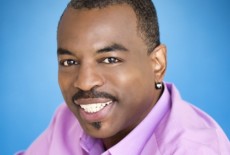J.K. Simmons
Published March 15, 2011 in The A.V. Club
The actor: Though Jack Nicholson took over for the film version, Jonathan Kimble Simmons got his first big break playing Colonel Nathan Jessep in Aaron Sorkin’s original stage version of A Few Good Men. Simmons was 40 before he landed his first bit parts on soaps and cop shows, shortened his name to J.K., and moved on to meatier roles in For Love Of The Game, The Gift, and Sam Raimi’s Spider-Man movies. Today, Simmons is best known for his recurring roles as psychiatrist Dr. Emil Skoda on Law & Order, Assistant Chief Will Pope on The Closer, and white supremacist Vern Schillinger on Oz, as well as a veritable boatload of scene-stealing bits in Raimi, Jason Reitman, and Coen brothers films. His latest role, as the father of a brain-trauma victim in The Music Never Stopped, which recently debuted at the Sundance Film Festival, is a distinct departure from his typical deadpan comedian/guy-in-charge roles.
The Music Never Stopped (2011)—“Henry Sawyer”
The A.V. Club: This character has much more depth than in roles like, say, J. Jonah Jameson [from the Spider-Manseries] or your work in Jason Reitman films.
J.K. Simmons: It’s based on an Oliver Sacks case study called The Last Hippie. It takes place in the ’50s, ’60s, and ’80s, and it’s this really cool family drama about love and redemption. I prefer not to give away plot stuff… I basically spent six weeks in New York crying every day. There’s a lot of depth, a lot of major dramatic stuff that’s going on in these people’s lives. It was just so well-written. It was so good on the page that I felt like all we had to do as a cast was just make it real and not screw it up.
AVC: Coming off your most recent projects, mostly doing voiceover work for children’s media including Generator Rex, Megamind, and Cats & Dogs: The Revenge Of Kitty Galore], was it hard to jump back into a dramatic role?
JKS: No, not really. It’s actually always preferable to me to do something different than what I just finished doing. With this, there was never any issue with “Am I going to be able to sort of reach the emotional levels I need to?” In fact, the opposite is often the case, and certainly was here. There were scenes where, they were just very emotionally charged, and I realized I can’t be crying and slobbering the whole movie. We had to pick our spots. There were many times when the chore was to hold it in a little bit.
Homicide: Life On The Street (1996)—“Colonel Alexander Rausch”
AVC: This kicks off your first role as a white supremacist—
JKS: A hugely pivotal moment. It was a nice meaty part, and then it started relationships with Tom Fontana and Ed Sherin that turned into Oz and Law & Order. Within a year or so after [Homicide], they were casting Oz. They didn’t even have scripts yet. I’m just a theater actor who’s barely making my rent and I’m auditioning for Tom Fontana for, we didn’t know at the time, it wasn’t supposed to be a regular on the show, but it was going to be a good part. And I was excited about it, but I was also nervous about it, because I had gotten so much attention playing that Nazi white-supremacist murdering bastard on Homicide. I thought, “I really don’t want to be stuck playing this character for the rest of my life, and be like the Nazi of the week on every TV show.”
I went into that meeting with Tom when I should have just been lying down at his feet saying “Please hire me!”, and instead I was like, “I’m a little apprehensive… I’m afraid it could hurt my ability to have the career that I would like to have, being a versatile actor playing different parts, like I’ve been doing in theater for 20 years.” Tom really put me at ease and said “The character is going to start out to be a guy we think is a good guy, and then there’s going to be changes. Trust me, you’ll love it.” And I said “Great!” Of course the character went from being a potential nice guy to a rapist bastard in the first half-hour of the first episode, but it was a fun six years.
Oz (1997-2003)—“Vern Schillinger”
AVC: What attracted you to the part?
JKS: I knew enough at that point to know that Tom was one of the great creative talents out there. If you’re doing a prison show, HBO is the absolute best place in the world to be doing that, because you’re not going to have to do all that, you know, Prison Break stuff where you can’t really behave and speak like people do in a maximum-security prison. The first episode, they were trying to protect themselves financially, and they wanted to have a version of the show that they could sell into syndication. We were literally shooting a scene where I would say “You fucking nigger! I’m gonna shove this so far up your ass, you’re gonna blah blah blah!” And then they’d go, “Okay, TV version,” and we’d do it again, and I’d say, “You gosh-darn negro! I’m gonna hurt you and spank your bottom!” It was insane. Tom came to set and just watched us do one take of one TV version and said “Yeah, fuck that. We’re not doing that.”
AVC: Is it harder to find depth in a character that’s written as a typical good guy, or to find a hint of humanity in a role like Vern Schillinger?
JKS: [Schillinger] was a pretty heinous character, but we were always looking for ways to see some humanity, to show him interacting with his sons, and then a few years in, with the grandson. The way I approached it as an actor, it was similar to the colonel from A Few Good Men. He’s the bad guy, but everything he was doing, in his mind he was doing for love. Love of the Marine Corps and love of his country. He firmly believed that what he was doing was right, and he didn’t care how he had to go about it. In a much more extreme way, Schillinger was the same. He was a white-supremacist crazy motherfucker who believed in his stance on life, and as evil and sadistic and fucked-up as he was, to me at least, you have to find a humanity in any character you play. You can’t play a guy who’s just a snake, because what do you draw on?
AVC: Is it difficult to stay with a character like that for six seasons?
JKS: It’s actually kind of easier, in a way. You’re getting to really develop a character instead of just doing the same thing over and over. It definitely can be a challenge to keep it fresh sometimes, but you really get the bonus of being able to look at a character from a lot of different angles.
AVC: When you’re playing a character that you have to sustain for season after season, like Vern Schillinger or Emil Skoda or Will Pope, is it hard to let it go at the end?
JKS: It was really hard to let it go, and when Oz ended, it was very bittersweet. I totally understood why [Tom] did it. He just said “What can I put these characters through without totally jumping the shark?” He felt like he had done what he set out to do, and he made an iconic piece of “It’s not TV, it’s HBO.” It was a challenging and really interesting character to play, but there was this other part of me who was like “I said I didn’t want to play this character for the rest of my life.” And thank God Law & Order came along, and I got to play the sardonic, level-headed shrink. It was time to move on.
Law & Order (2000-2001)—“Dr. Emil Skoda”
JKS: We had just finished the first year of Oz, and my agent gets this call that they’re offering me the part to be this new shrink on Law & Order, not as a regular, but as a recurring part. I’ve been watchingLaw & Order for years. It’s a procedural show. It’s about plot, plot, plot, and it’s very thorough, specific writing. I was having shrinks come up to me all the time in New York and since we’ve been in L.A., saying how real that character was. That’s a compliment to me, but it’s at least as big a compliment to the writers. I never saw a script before I started playing Skoda, but I had absolute confidence that it was going to be something good. I do this for a living, so it was nice to be getting some paychecks, and especially being a theater guy, to be making some grown-up money for the first time.
AVC: You’ve had a trend of playing FBI agents, doctors, guys in charge. Is there anything that speaks to you about that kind of role?
JKS: I still have problems with authority figures, certainly did as a young person, so it’s interesting that I always end up playing authority figures. I play tons of authority figures, whether it’s the dad or the cop or the boss. I think it’s a combination of how I look, who I am. By the time I started doing TV and film, I was in my forties, so I wasn’t going to do the young up-and-comer. I’m a bald guy. I’ve got a low voice. It’s just sort of a natural evolution to be playing those kinds of parts. I’m going to shoot a film called Contraband in New Orleans with Mark Wahlberg next month, and I’m playing a captain. For better and worse, I do the authority figure a lot. I’d love to, if there is a next TV series, instead of playing the Will Pope character, I’d love to play the Provenza character [from The Closer] or the Sipowicz character [from NYPD Blue], the guy who’s been there and done that, but has no interest in being the authority figure.
The Closer (2005-2011)—“Assistant Chief Will Pope”
JKS: I had done a previous short-lived show with James Duff, the creator and head writer of The Closer, a show called The D.A., where I played a supporting character. It was my first quote-unquote “series job” in L.A. It actually only ran four episodes, but it was great, great, great writing. Six months or a year later, James called me and said “I have this new show. It’s gonna be on TNT. I wrote this part with you in mind. Would you like to read it?” and I said “I don’t even have to read it. I’ll do it.” I was actually, I think, the first guy hired for the show.
AVC: Is this really the last season?
JKS: It depends on who you ask. Now they’re talking about how the show might be able to continue, whether it’s still called The Closer, or whether it’s some kind of spin-offy thing. As far as my financial planning, I’m planning on it being the last year, but I’m hoping that it will continue in some form or another, because it’s a really good show. And it’s the biggest hit show in the history of cable TV, why would they take it off?
For Love Of The Game (1999)—“Frank Perry”
AVC: This movie kicked off your relationship with Sam Raimi, which spanned many projects. When you met Raimi, was there an automatic connection?
JKS: I had done a few small parts in movies, The Ref and The Jackal and this and that, and worked with a few famous actors. When I got the audition for For Love Of The Game, I read the novella of the same name. It’s a great book, and I happened to have been born and raised, spent the first 10 years of my life in Detroit. I was auditioning to play the team trainer, which was literally a two-line little part. All I knew was that it was about the Detroit Tigers, and I wanted to wear a Tigers jersey and be in a movie. I never do this: I dressed in my Tigers jersey and my Tigers cap and went to the audition, just praying to be able to sit in the dugout wearing that uniform. Sam and I start talking about the script and we start talking about baseball. Sam loves baseball, and baseball’s always been my game. I’ve played it. I’ve coached it. We started talking about some of what he thought were issues with the script, maybe this could use a little work. He’s talking about this with some schmuck who’s coming in to audition for two lines. That tells you what kind of guy Sam Raimi is.
We just chewed the fat in a really relaxed way for quite a while, and then he said, “Listen, would you mind looking at another part?” I said of course, and he had me read for the part of the manager. At the time, I was 41 years old, maybe, 42. I was in real good shape, and the manager was written as a crusty, 65-year-old white-haired guy, sort of a [former Tigers manager] Sparky Anderson type, and I thought “Well, this is really nice, but it’s not going to happen.” They offered me the part of the manager, and that whole movie was a really idyllic experience. Just hanging out in the dugout with all of these ballplayers, and having Sam have faith in me. We were improv-ing our butts off in that movie, as we did in all the Spider-Man movies, too. He would just turn the camera on and say “It’s the seventh inning, and he’s running around second base. What do you say? What do you do?” It was great.
AVC: It seems that a good first major film experience is rare. So many actors say that they did their first major film completely fearful, or were treated terribly.
JKS: That was probably my fifth or sixth film. My first film was The Ref, and I was scared out of my wits. Ted Demme, the director, treated me great, but there certainly were some people on that shoot who treated me dismissively. I was a guy who had three or four scenes in the movie, and nobody had ever heard of me. My second or third film was The Jackal, which I had a few lines in, but I was in the whole movie attached to Sidney Poitier’s hip, shooting all over the world. West Coast, East Coast, Canada, Helsinki, Finland, London, Moscow. And that was a great experience, because Sidney Poitier is just the coolest guy. The first grown-up movie I ever saw with my parents was Guess Who’s Coming To Dinner. To be playing really a bit part, but to be there every day and to have Sidney really assume the role of mentor and just be a great guy to work with was another awesome experience. [Laughs.] Wow, I just said “awesome.” I have children.
Spider-Man, Spider-Man 2, Spider-Man 3 (2002-2007)—“J. Jonah Jameson”
JKS: Those are obviously just a gift from on high. Sam and I, we did For Love Of The Game, and then I played a fun supporting part in a movie called The Gift, which is an underappreciated movie. While we were shooting The Gift in Georgia, word got around, even to me, who pays no attention to all, that Sam got the job to direct the Spider-Man movies. I started getting calls from friends saying “Oh, you should talk to Sam. You should play the bad guy. You’ve gotta play The Vulture if they have The Vulture.” Because again, I’m a bald guy. Later, when they were casting, Sam had me in mind to play JJJ. I went in and did this really stupid audition, which I think is on the DVD, which is embarrassing, and boom! It became what it became. It was ridiculously fun, again because a significant portion of what you see on the screen, even though the script was there and was good, we just screwed around and came up with gags and ideas. Liz Banks, who’s now a big stinky movie star, and Ted Raimi, Sam’s brother, and that Tobey Maguire kid, everyone who was involved in all those office scenes, it was like a little improv comedy troupe with Sam pulling the strings. It was always fun, even in Spider-Man 3, when Sam was being micromanaged by the studio and it was kind of stressful, even that one was kind of fun.
AVC: Are you not doing Spider-Man 4 because Sam Raimi didn’t direct it?
JKS: Yeah. A year ago, we went to Sam’s birthday party and we were talking about “Here’s some ideas for what JJJ is going to have in Spider-Man 4, and it’s going to be great fun, and blah blah blah,” and then a month later, boom, the rug got pulled. There are a million different versions why it got pulled. I think a significant factor was that the studio said, “Look, we have a release date in mind, and we’re announcing, and therefore the tail has to wag the dog now, and you have to start this movie now.” And they didn’t have the cast signed up, and they didn’t have a script that Sam felt like was anywhere ready to shoot, and eventually everything just fell apart, and [the studio] said “Screw it. We’ll start from scratch with a new director and a new cast.” That was a bummer for a number of reasons.
AVC: You’ve got a million small but memorable roles that come across like J. Jonah Jameson, like your roles in Juno, Burn After Reading, Extract, and Arrested Development. Does doing many of those add up to a big part in your mind?
JKS: Now that I am sort of established and my mortgage is paid and I don’t have to take every single thing that comes along, I’m still doing lots of small parts because for one reason or another, they’re worth doing. Whether it’s because of a relationship with Jason Reitman or the Coen brothers or Sam, or whether it’s just something I look at on paper and I’m drawn to. The Music Never Stopped is literally the first time in my life I’ve been No. 1 on the call sheet, and it’s a really unfamiliar position to be in. I really enjoy a lot of aspects of coming in and being a supporting guy, not the least of which is the lack of responsibility, because that means I get to spend more time with my family, coaching my kids’ baseball team, and I don’t lose sleep, because the whole thing is not on my shoulders, and I’m not producing and directing and starring and all that stuff. Basically, I’m just lazy, I guess.
AVC: With Burn After Reading, Roger Ebert said “[Simmons] doesn’t have much dialogue, but every line is a punchline.” That’s applicable to probably 20 films on your résumé. If you only have a few lines, how do you prepare to make a part so small stand out?
JKS: That was a very astute review. When I read that part and they finally asked me to do it after like six auditions—the Coen brothers, because they’re so specific—I realized “You know, this part is two scenes, but in a way, it literally is the best part in the movie, because all of this crazy stuff has been going on for an hour and a half, and then we cut to me and David Rasche, and we tie up all the loose ends in this brilliant dialogue. I thought “This is, again, a can’t-miss. All you have to do is show up and not screw up and do what Joel and Ethan tell you to do, and it’s all right there.” It was an absolute no-brainer to me.
AVC: You’ve said that the best compliment you’ve ever gotten is that people don’t notice you. When a movie happens, a television show happens, and you just blend. Do you ever get tired of that?
JKS: I really always felt like my job is not to make it all about how beautiful is my singing voice. My job is “Brahms wrote this beautiful music, and here it is,” or “Shakespeare wrote this insanely great play, and this is what he wrote.” I’ve worked with tons of great actors who have a completely different philosophy. Fortunately, there’s room for everybody as long as you’re delivering the goods. To me, most of the time, if someone sees something and I disappeared into it, that’s high praise.
—Christina Couch
